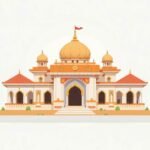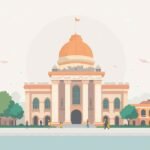Introduction
In the rich tapestry of Hindi literature, few figures shine as brightly as Ramdhari Singh Dinkar. Revered as the “Rashtrakavi” (National Poet) of India, Dinkar’s poetry was not just a reflection of his era but a clarion call for freedom, justice, and national pride. Born on September 23, 1908, in Simaria, Bihar, his verses, particularly those steeped in veer ras (heroic sentiment), stirred the hearts of millions during India’s struggle for independence.
One of his most iconic poems, रामधारी सिंह दिनकर की कविता हुंकार (Hunkar), captures the essence of his revolutionary spirit:
“सिंहासन खाली करो कि जनता आती है,
बहुत हो गया राजाओं का राज,
अब राजा होगी जनता, जनता का राज।”
(Translation: “Vacate the throne, for the people are coming, / Enough of the rule of kings, / Now the people shall rule, it shall be the people’s reign.”)
These lines reflect Dinkar’s fiery spirit and his commitment to democracy and social justice. As we explore his life and works, we’ll uncover how this poet became a voice for the voiceless and a beacon of hope for a nation yearning for freedom. Why did his words resonate so deeply? Perhaps it’s because they spoke to the heart of a nation’s struggle, blending raw emotion with timeless wisdom.
Early Life and Education
Ramdhari Singh Dinkar was born into a modest family in Simaria, a small village in Bihar’s Begusarai district. His father, Ravindra Singh, was a farmer, and his mother, Manroop Devi, was a homemaker. Growing up in rural India, Dinkar faced economic challenges, yet his love for literature blossomed early. As a child, he would pore over books, finding solace in the world of words.
After completing his early education in his village, Dinkar moved to Simultala for high school. In 1926, he enrolled at Patna College, where he was exposed to diverse literary and political influences. He was particularly inspired by Rabindranath Tagore’s poetic elegance, Mahatma Gandhi’s call for non-violence, and Karl Marx’s ideas on social justice. These influences shaped his worldview, blending nationalism with a deep concern for the marginalized.
Dinkar graduated with a degree in Persian from Patna University in 1929 and later pursued a master’s degree in Hindi. His academic journey laid a strong foundation for his career as a poet, scholar, and freedom fighter. But what drove a young man from a small village to become a literary giant? It was his unyielding passion for justice and his belief in the power of words to inspire change.
Literary Career
Dinkar’s literary journey began with his first published poem, Vijay Sandesh, in 1928, marking the start of a prolific career. His early poetry was characterized by its patriotic fervor and revolutionary zeal, reflecting the turbulent times of India’s independence struggle. Over the years, his work evolved, incorporating themes from mythology, social issues, and human emotions, making रामधारी सिंह दिनकर की कविताएं (Dinkar’s poems) timeless.
Dinkar often drew inspiration from Hindu epics like the Mahābhārata and Rāmāyaṇa, using them as allegories for contemporary struggles. This blend of tradition and modernity set him apart as a unique voice in Hindi poetry. His ability to connect with the masses through rhythmic, powerful verses made him a beloved figure.
Key Poetic Works
Here are some of Dinkar’s most notable works:
- Rashmirathi (1952): A retelling of Karna’s life from the Mahābhārata, focusing on themes of injustice and heroism.
- Kurukshetra (1946): A narrative poem based on the Santi Parva of the Mahābhārata, exploring the aftermath of war and the quest for peace.
- Urvashi (1961): A poetic masterpiece that earned him the Jnanpith Award, delving into themes of love and beauty.
- Parashuram ki Pratiksha (1963): A collection reflecting on social and political issues.
- Hunkar (1938): An epic poem that became synonymous with the call for freedom and justice.
Dinkar’s poetry is celebrated for its vivid imagery, emotional depth, and rhythmic beauty. His verses weren’t just words on a page—they were a rallying cry for a nation. How did he manage to capture such raw emotion? Perhaps it was his deep connection to India’s struggles and his ability to see poetry as a tool for change.
Heroic Poems (Veer Rasa)
Dinkar’s mastery of रामधारी सिंह दिनकर की वीर रस की कविताएं (heroic poems) is most evident in Rashmirathi, Kurukshetra, and Hunkar. These works not only showcase his literary genius but also reflect the socio-political climate of his time, particularly India’s fight for independence.
Rashmirathi
Rashmirathi tells the story of Karna, a tragic hero from the Mahābhārata. Dinkar portrays Karna as a symbol of the oppressed, highlighting themes of social injustice and the quest for dignity. The poem resonates with readers as it addresses universal themes of honor, loyalty, and resilience. Lines like “जो है दुखी, जो है दरिद्र, जो है पराजित, / वह करन है” (Translation: “He who is sorrowful, poor, defeated, / That is Karna”) capture the essence of Karna’s struggle, mirroring the plight of India’s marginalized.
Kurukshetra
Set against the backdrop of the Mahābhārata’s great war, Kurukshetra explores the moral and ethical dilemmas faced by warriors and commoners. Dinkar uses the epic to depict the horrors of war and the longing for peace, making it relevant to contemporary conflicts. The poem’s reflective tone asks: Can humanity ever escape the cycle of violence? Its philosophical depth made it a cornerstone of Hindi literature.
Hunkar
Perhaps Dinkar’s most famous work, रामधारी सिंह दिनकर की कविता हुंकार (Hunkar) is a revolutionary call to action. Its lines, like “सिंहासन खाली करो कि जनता आती है,” have become immortal in Indian literature. The poem urges the people to rise against oppression and claim their rightful place in society. Written during the height of the independence movement, Hunkar became a rallying cry for freedom fighters.
These heroic poems established Dinkar as a leading voice in Hindi poetry and played a pivotal role in galvanizing the Indian populace. Why do these poems still resonate? Their universal themes of justice and resistance continue to inspire readers across generations.
Other Works
Beyond poetry, Dinkar was a prolific writer of prose, essays, and literary criticism. His prose works include:
- Sanskriti ke Chaar Adhyaya (1956): A series of essays on Indian culture and civilization, earning him the Sahitya Akademi Award.
- Mitti ki Or (1946): A collection of essays on social and political issues.
- Chittaur ka Saakaa (1948): A historical account of the siege of Chittorgarh, symbolizing resistance against tyranny.
His literary criticism, such as Sahitya aur Samaj and Kavi aur Kavita, offers profound insights into literature and society. Dinkar’s translations of his own works, including Urvashi and Kurukshetra, into English and other languages helped introduce his poetry to a global audience. His versatility as a writer made him a true literary giant.
Role in Indian Politics
Dinkar was not just a poet but an active participant in India’s independence movement. Influenced by Mahatma Gandhi, he joined the Quit India Movement, using his poetry to express the aspirations and frustrations of the Indian people under colonial rule. His verses became anthems for freedom fighters, igniting hope and courage.
After independence, Dinkar served as a member of the Rajya Sabha from 1952 to 1964, advocating for social justice, education, and cultural preservation. His political writings and speeches reflected his commitment to democratic values and his vision for a progressive India. Could a poet truly shape a nation’s destiny? Dinkar’s life suggests that words, when wielded with purpose, can move mountains.
Read More: Rojgar Samachar 2025: Guide to Govt Jobs in India
Awards and Recognitions
Dinkar’s contributions were recognized with several prestigious awards:
| Award | Year | Work |
|---|---|---|
| Padma Bhushan | 1959 | Contributions to literature |
| Sahitya Akademi Award | 1959 | Sanskriti ke char adhyay |
| Jnanpith Award | 1972 | Urvashi |
These accolades underscored Dinkar’s status as a national treasure. His ability to blend poetic brilliance with social commentary earned him a place among India’s literary elite.
Legacy and Influence
Ramdhari Singh Dinkar’s legacy endures through his timeless poetry and prose. His works are studied in schools and universities, admired for their literary excellence and their reflection of India’s socio-political history. Dinkar’s ability to blend classical themes with contemporary issues made his poetry accessible and relevant to a wide audience.
His influence extends beyond literature; he is remembered as a symbol of resistance and a champion of justice. His poems, like Hunkar, are recited in public gatherings, keeping his spirit alive. In contemporary times, Dinkar’s works are referenced in discussions on nationalism, patriotism, and social justice, inspiring artists, writers, and activists. Why does his voice still echo? Because his poetry speaks to the eternal human struggle for dignity and freedom.
FAQs: Ramdhari Singh Dinkar
Who is Ramdhari Singh Dinkar?
Ramdhari Singh Dinkar was a renowned Hindi poet, essayist, and freedom fighter known as the “Rashtrakavi” of India.
What are some of his famous works?
His famous works include Rashmirathi, Kurukshetra, Urvashi, and Hunkar.
Why is he called the “Rashtrakavi”?
He earned the title “Rashtrakavi” for his patriotic poetry that inspired India’s independence movement.
What awards did he receive?
He received the Padma Bhushan (1959), Sahitya Akademi Award (1959), and Jnanpith Award (1972).
How did he contribute to Indian politics?
Dinkar was a member of the Rajya Sabha and participated in the Quit India Movement, using his poetry to fuel the independence struggle.
Conclusion
Ramdhari Singh Dinkar was more than a poet; he was a visionary who used his art to shape India’s destiny. His life and works embody the spirit of the independence struggle and the quest for a just society. As we reflect on his contributions, we are reminded of the power of literature to inspire change and unite people. Dinkar’s legacy is a testament to the enduring relevance of his message: that words can ignite revolutions and build nations.











